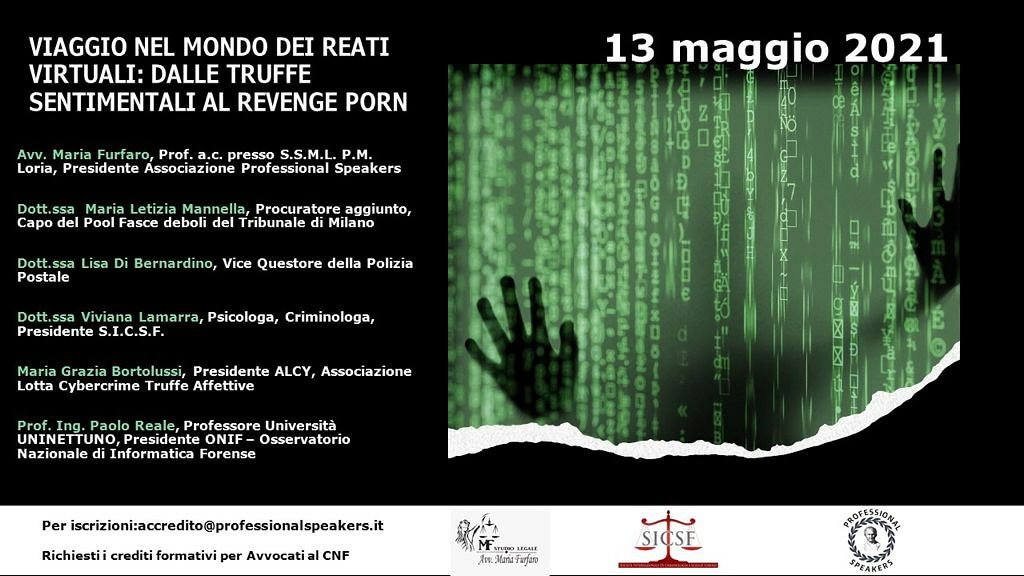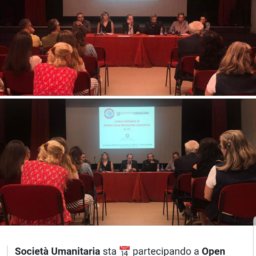
THE virtual crimes they are constantly evolving and represent the negative side of digitization.
Cybercrimes can be of three types: property-related, individual or against the state. In this article we will focus on some of those related to the person because of soliciting minors, from revenge porn and of scams "sentimental” we will deal with the next May 13 in a webinar organized by
Study Legal Attorney Maria Furfaro
Professional Speakers
International Society of Criminology and Forensic Sciences.
The speakers will be excellent:
Dr. Maria Letizia Mannella,
Deputy Prosecutor, Head of the Weak Groups Pool of the Court of Milan
Dr. Lisa Di Bernardino,
Vice Quaestor of the Postal Police
Dr. Viviana Lamarra,
Psychologist, Criminologist, President of SICSF – International Society of Criminology and Forensic Sciences
Maria Grazia Bortolussi,
President of ALCY, Association for the Fight against Cybercrime Affective Scams
Prof. Paolo Reale,
Professor at UNINETTUNO University, President of ONIF – National Observatory of Computer Forensics
Article 609-undecies of the Criminal Code regulates the crime of " soliciting a minor” which reads as follows:
“Anyone, for the purpose of commit the offenses referred to in articles 600, 600 bis, 600 ter and 600 quater, even if relating to pornographic material referred to in Article 600 quater 1, 600 quinquies, 609 bis, 609 quater, 609 quinquies and 609 g, solicits a minor of sixteen years, is punished, if the fact no longer constitutes a serious crime, with imprisonment from one to three years. Grooming is any act aimed at gaining trust of the minor through tricks, flattery or threats put in place also through the use of the internet or other networks or means of communication".
It is a sneaky crime made concrete through techniques of psychological manipulation aimed at weakening the will of the victim and creating a relationship of trust with the solicitor for the purposes of exploitation or abuse.
In order for the crime to be considered integrated, the consummation is not necessary, it being sufficient that merely preparatory conducts are put in place.
It is, therefore, a crime of danger aimed at neutralizing the risk.
In other words, the case examined sanctions a conduct that precedes the abuse of the minor, thus anticipating the threshold of punishability.
The perpetrator can be anyone, usually someone considerably older than the solicited minor. But it's not always like this. Obviously he introduces himself as a contemporary.
Contacts via the web are greatly facilitated, often due to the lack of parental control and also because minors tend to post everything and locate themselves everywhere.
Pedophiles know what manipulative techniques to use to "approach" boys, establish contact and after preparing the ground for the request for images of a sexual nature, request a live meeting.
Grooming is a crime that can be prosecuted ex officio and must be reported to the judicial authorities or to the police forces.
If you notice that a minor (child, student, family friend) is in contact with an unknown adult, it is important to report and inform the family so that they can take action to protect the victim.
The escalation of a solicitation is unpredictable: the virtual relationship can last for months or lead to an encounter in the space of an afternoon.
The minors most at risk are those who spend many hours online alone and without supervision.
The perpetrators who manage to meet these children take photos and videos of sexual violence to disseminate them in the online circuits of the deep web, convinced that they are protected by greater confidentiality and sure of playing a privileged role in the "pedophile community".
But as mentioned, there are many virtual crimes…
From the site of Police post it turns out that “In the field of online scams, during 2020 they were
treated a total of 98,000 cases.
Particular attention was paid to the prevention and fight against revenge porn with 126 cases treated and 59 reported; to online defamation with 2,234 cases and 906 people reported; 143 cases were related to "stalking" with 7 arrested and 73 reported and to the so-called "sextortion" with 636 cases dealt with, one person arrested and 36 reported.
The crimes relating to the so-called "Red Code", whose investigations are profuse not only to identify the perpetrator of the crime, but also to remove the contents from the web or, at least, to limit their massive disclosure, have seen in the Police Postale a point of reference for the many victims of crime.
Even in the repression of the crimes of threats and harassment, perpetrated through social networks or with "traditional means", the Postal Police was maximum commitment with 1001 cases dealt with, 2 arrested and 270 people reported.
The investigative activity aimed at curbing the phenomenon of hate speech was particularly complex, leading to the processing of numerous reports from users through the online Police Commissioner's Office, and active monitoring of the network through social platforms.
In this context, particular attention was paid to the acts of intimidation carried out against journalists, with the active participation, in an operational key with suitable prevention and contrast initiatives, in the Sub-group set up at the Central Directorate of the Criminal Police - Service Criminal Analysis.
There were 35 interventions by the Postal Police Offices located throughout the national territory, coordinated by the Postal Police Service, aimed at preventing suicidal intent by social network users, also thanks to the reports received by the PSOnLine Commissariat ".
One of the main novelties contained in the CD "Code Red” (law 19 July 2019, n. 69) is represented by the introduction into the penal code of the crime of illicit dissemination of sexually explicit images or videos.
Only in recent years has the devastating scope that such crimes can have been understood: in Italy, in particular, there has been talk of a bill that would protect the victims of "pornographic revenge" only after the case of poor Tiziana Cantone. A woman who, due to some videos posted on the net against her will, committed suicide in 2016. The argument that awakened consciences, however, was the case
of the parliamentarian of the Five Stars, Giulia Sarti.
The revenge porn consists in the publication, or threat of publication (also for the purpose of extortion), of photographs or videos showing people engaged in sexual activity or portrayed in sexually explicit poses, without the consent of the person concerned.
The case presents a complex discipline divided into two different hypotheses governed respectively by paragraph 1 and paragraph 2.
Paragraph 1 of the art. 612-ter of the criminal code punishes (unless the fact constitutes a more serious crime) anyone who, after having made or stolen them, sends, delivers, transfers, publishes or disseminates images or videos with sexually explicit content, intended to remain private, without the consent of the persons represented, is punished with the
imprisonment from one to six years and with a fine from Euro 5,000 to Euro 15,000.
Paragraph 2 provides that the same penalty applies to anyone who, having received or in any case acquired the images and videos referred to in the first paragraph, sends, delivers, transfers, publishes or disseminates them without the consent of the persons represented in order to bear their harm.
Two different types of crime: the dissemination of images or videos with sexually explicit content, intended to remain private, without the consent of the persons represented by those who made these images and by those who receive them and contribute to their further dissemination in order to create harm to the persons represented.
Against revenge porn, from the site of Privacy Guarantor, I emphasize an emergency channel for potential victims. A collaboration between the Privacy Guarantor and Facebook to help people who fear the dissemination of intimate photos or videos without their consent
The Guarantor for the protection of personal data makes an emergency channel available on its website.
People who fear that their intimate photos or videos could be released without their consent on Facebook or Instagram can report this risk and have the images blocked.
The preventive reporting channel is the one activated last year in Italy, as a pilot program, by Facebook and which has so far been accessible in our country only through a non-profit association.
From 8 March 2021, adults who fear that their intimate images, present in photos and videos, will be shared, can therefore contact the Privacy Guarantor, by consulting the page
www.gpdp.it/revengeporn, to report their existence safely and confidentially to Facebook and have them blocked.
On the page prepared by the Guarantor, potential victims of non-consensual pornography will find a form to fill in to provide the Authority with information useful for assessing the case and to indicate to the interested party the link to directly upload the images to the program.
Once uploaded, the images will be encrypted by Facebook using a "hash" code, so as to become unrecognizable before being destroyed and, through a comparison technology, blocked from possible attempts to publish them on the two platforms.
We will talk to you about this and much more on May 13th. For registrations use this format 👇











